Patricia Bullrich, PRO party chair and a 2023 presidential hopeful, analyses Argentina’s economic and political situation, affirming that Juntos por el Cambio’s tickets will be drawn from across the coalition, without ruling out the possibility of the Radicals presenting their own lists.
The former national security minister, 66, insists the opposition will win in next year’s elections. The government does not worry her, she says, because “they have no candidate.”
Do you think that Mauricio Macri will finally make a bid for the presidential candidacy in the next PASO primaries?
The truth is that I have no clear idea what he wants but whatever it is, it seems to me that he should go through with it. But I cannot answer you yes or no.
Would that change your bid?
No, at this stage, everybody knows me and once I make a decision, I’m very persistent with it.
Were there to be two PRO hopefuls and one Radical in the PASO primaries, would that be a problem for PRO or, on the contrary, an advantage?
I don’t think that there are going to be PRO and Radical candidacies. I think that we are heading towards a ruling coalition, which means the integration of the parties forming part of the coalition. So I feel that there will be combo tickets, which seems to me the best way of integrating not an electoral coalition, as in 2015, but a governing coalition where we all take responsibility for the changes Argentina needs.
In a recent interview Mauricio Macri said that he saw you as a president. Does it worry or gladden you that he backs you, is the ex-president marking his preference for a candidacy a problem?
I don’t think it was quite like that, afterwards I saw the interview and he said...
That he saw you as a president, word for word.
Yes, that he saw me as president but he also spoke of [Buenos Aires City Mayor] Horacio Rodríguez Larreta so perhaps that phrase does not interpret everything he said. I feel that he has to be above it all and it does not seem good to me for him to decide on backing any one candidacy.
It seems to me that we hopefuls must prove our worth on our own account, displaying our programmes, our visions and our forms of governance, how we face the challenge of the changes which are the main debating point for a society asking: “How are they going to do it?”, a very potent question for society today. So I think that perhaps it’s good to stay above all the infighting.
In presidential democracies like ours, two-headed leaderships like [Juan Domingo] Perón and [Héctor] Cámpora, [Néstor] Kirchner and [Eduardo] Duhalde or Alberto Fernández and Cristina Fernández de Kirchner do not work out. With the current experience, Argentines have understood that a president who is bossed around brings problems and will not want to elect a president who is subordinate to anybody. With Macri as the leader and protagonist of Cambiemos saying in his book that he will approve the candidate and even announcing that he should be the king [or queen]-maker, isn’t there a risk of the voters thinking that the new president will be subject to Macri? Isn’t there a risk of the people wanting to elect a different president?
In my case, I have sufficient personality, as I have demonstrated throughout the posts I have had to hold, which have always been complex handling a lot of people, like the Security Ministry (2015-2019). The contribution which Mauricio Macri could make is to say: “Watch out there, we’ve already gone down that road and it did not turn out well for us,” rather than trying to play boss – which I do not see in his personality – because there can only be one chief in a presidential democracy, as we Argentines know only too well – we’ve suffered on numerous occasions with short governments like Cámpora’s, governments in which Duhalde never completely explained that he was not Kirchner’s boss and Kirchner ended up crushing him when Duhalde could have given important advice to Kirchner without even going into this more recent experience with Alberto Fernández and Cristina Fernández de Kirchner. I think that the advice of [former Uruguayan President Julio María] Sanguinetti is important but in the final analysis the power belongs to one person who listens [to everybody] but often has to take decisions alone.
Do you feel closer to the ideas of the Radical party or to the libertarians?
The Radicals are a party with substantial ideas which have given them 131 years of history. Not everybody has been able to sustain the idea of education, which is a very powerful Radical banner, over 131 years, nor the idea of human rights nor the idea of democracy – ideas which the Radicals have long sustained with great stability. So that Radical backbone is a backbone with which I feel myself identified, their republican outlook.
The libertarian world is more disordered with some very interesting strands like liberty and thinking that the Argentine economy must be turned upside down once and for all rather than building on what is already there. And that makes it disruptive – old ideas in new forms. That’s why it seems to me that Juntos por el Cambio should join up these strands within Juntos por el Cambio. We have liberal ideas with that Radical backbone which is very substantial and which has made them live on for so many years.
I’m reminded of that New York Times definition which I always repeat, that “you should be on the right in economics, in the centre in politics and to the left in culture.”
And also social issues.
Do you seek to amalgamate the Radicals and the libertarians with more right-wing economics (the libertarians) and a more progressive culture (the Radicals)?
An ordered, stable economy with the rules of competitive capitalism without any arbitrary discretion but with a broad social outlook because Argentina is a country with an outlook of social integration. The schooling, the culture and the idea of the middle class is an idea of integration, of being able to be happy and enjoy welfare and progress while living in a world of culture, theatre, cinema, museums or the cultures you might find in Jujuy, Catamarca or Salta – every place has its culture. So I sincerely believe that integration is very important for the future. Today’s world is not governed by one single idea disintegrating all the rest. No, today’s world is governed by the capacity to integrate along the lines of liberty, competitive capitalism, states of the proper size and taxes which are not confiscatory along with a series of economic ideas. To which you should add to stop having only schools without having education – we must have schools which educate. I’m not saying that all schools fail to educate but I have not the least doubt that we must make a fundamental change there. So my feelings are for a competitive economy with a social hug for a long-suffering population.
You were speaking of republican values and the historic legacy of Radicalism and also pan-Radicalism, including Elisa Carrió, to whom you were once close. What does it do to you to hear Elisa Carrió denouncing that the Juntos por el Cambio government spied on her?
It hurts me. I cannot imagine that a government like ours, democratic, republican and transparent, could use the state apparatus to spy on a party colleague. It hurts me to say this but she will have to prove whether she was spied on or not. Sincerely it hurts a lot. That’s why I believe we must pluck up the courage to dismantle the intelligence services as they now are in Argentina.
When your government started, some of its members proposed shutting down AFI [intelligence services] because they thought it was an inexhaustible source of problems. Others said that it was strange placing [Gustavo Arribas] a personal friend of Macri without any experience in that field at the helm of AFI and that is one of the issues for which Macri has been most criticised. Was the decision to maintain AFI while placing an inexperienced person at its head correct?
I think we should have made a far more drastic change in AFI because it came to us already very tainted. Every government has been accused of using AFI [or SIDE, as it was formerly named] for their own benefit, thus calling for drastic solutions. I think we must have an intelligence service which looks out to the world but it has to be revamped. A chance must be given to people who have had none…
What AFI agents cannot have is a political or judicial anchorage with anybody. They must be analysts who know what the country needs with the international training which Argentina needs and excellent relations with other intelligence services because today’s intelligence work is intra-agency. They all have to trust us to send us information. So I consider that we’re going to have to redefine intelligence totally. My bets are on a law creating a council in which all the political groupings participate. Intelligence work cannot only be in government hands, there must be a State Council with professionals running Argentina’s intelligence.
Who do you think your Frente de Todos rival will be if you win the Juntos por el Cambio primary?
Ay, ay, ay... They have no candidate.
What do you imagine will happen?
I don’t think that Cristina Fernández de Kirchner will stand in the end so anybody could run without leadership. Which is dangerous because what happened before could happen again.
Do you think the candidate could be [Economy Minister] Sergio Massa or will Alberto Fernández himself seek re-election?
I don’t see it as Sergio Massa because his current task is going to be incompatible with a candidacy. And while Cristina Kirchner has the dominant political force, we all know that she has already said before: “I cannot top the ticket” and now with this crisis, far less.
Under these circumstances would it end up in an Alberto Fernández-Daniel Scioli ticket?
But Alberto Fernández, after the role he has played, cannot run again. I don’t know. He can, of course, and has every right, but he would not be very competitive.
So if not Massa or Cristina…
It could be a governor or a La Cámpora militant. Logically somebody more like…
For example, [Interior Minister Eduardo] ‘Wado’ de Pedro. Do you imagine somebody like that?
I don’t know Wado de Pedro, I’ve never met him so I don’t have much opinion about him. But logically it should be somebody representing the predominant ideas in Peronism, i.e. Kirchnerism. Because it’s [always] Cristina when you ask for whom would you vote among the candidates Cristina, Alberto and Massa? Cristina is ahead of them all although now she has a problem with society. So it is more logical that it should be somebody closer to her. That’s not the best thing for the country but more logical in terms of electoral competition.
In what state do you imagine the economy reaching the elections, what is the scenario which you and your advisors imagine?
We believe that the minor measures being taken depend on their acceptance within the government. If the acceptance is low, they could run into problems before the elections.
By “within the government” are you referring to Kirchnerism and Cristina Kirchner?
Yes.
Concretely, whether Cristina Fernández de Kirchner will put up with Massa.
Cristina Kirchner is putting up with him because she knows that if not, there will come hyperinflation. But Argentina already has 100 percent inflation... Any economy, any economics course around the world will tell you that this is already hyperinflation. But not here, we’ve become accustomed to 100 percent inflation. They know that inflation will take a leap if they begin a “plan platita” of runaway spending, thus giving them a very slender margin. That’s why Cristina puts up with him [Massa] while Máximo Kirchner criticises him saying: “This goes against the workers, this is the worst government which goes against the workers,” as he did the other day in Plaza de Mayo. So they play that double role and think that somebody might believe them when in reality they are undermining their own government. In consequence Massa is trying to knead his masa [“dough,” a play on words in Spanish] and stretch it out as much as possible until election day so that afterwards we face the problems. That is why as from today we have to go telling society every day what they are doing such as placing all the money under the carpet, the snowballing Leliqs (bonds), the umpteen exchange rates, the runaway inflation, the total import shutdown halting much of the economy and the continuous tax increases. So we have to tell the people clearly what they are doing.
Would it be better if they did reach December [next year] and pass the problems onto the next government?
I don’t think that there is a good solution. The best thing would be to give more depth to what they are doing now. Massa promised that he was going to comply with the terms of the International Monetary Fund (IMF), lowering (the fiscal deficit) by 1.2 percent (of gross domestic product) and two points next year. Until now he has only just started with half a year going by without structural changes.
What do you think the failure to come together for Peronist Loyalty Day on October 17 means? Do the divisions between those in the Obras [Sanitarias] stadium and those in Plaza de Mayo remind you of the Peronist differences in the 1970s between their socialist and trade union supporters (patria socialista and patria sindical)?
It seems to me that Peronism is in a major crisis as it was between 1970 and 1975. It is important to understand that they are going to attempt the impossible to stay in power. That is why everybody with their own territory like the mayors and governors are escaping from the government and trying to save their own turf. Now they have a very big crisis of representation and I believe that this split might hopefully make some of them look to the future instead of seeing who can bother the next government the most. We are hoping for a co-operative attitude from at least one sector.
What would be the role of the trade unions as from December next year were you to become president?
For me the role of the trade unions would be to do what they say in public and (far more often) in private. The other day at the IDEA symposium I heard several trade unionists talking about the need to modernise labour legislation. Well, now they should do it, not go saying in private: “No, because I think that it will all turn out wrong.” Afterwards, when you speak in public, they say the complete contrary. Argentina needs the truth. If you believe that the labour legislation must be changed because it is no longer of any use, then say so in public and private.
You were the only person in your party, or so I understand, who did not repudiate in public the attempt to assassinate the vice-president. What message were you sending by not sending a message?
No, what I did was to await the presidential speech. And when I saw the president, instead of a statesmanlike appeal to everybody like [Raúl] Alfonsín in the face of the uprisings against him, go on the attack with a factional harangue and declaring a public holiday, I said to myself: “How can the President respond this way to the gravity of events?” I did not use the word “repudiation.” I do not like word policing, being told what I have to say. I said it in my own words and what the president said seemed really terrible to me. I had already spoken of the gravity of attempting to assassinate the vice-president.
Patricia, Frente de Todos deputy Rodolfo Tailhade has said that [would-be alleged assassin Fernando] Sabag Montiel “is absolutely linked to Bullrich and [Javier] Milei.” What is your view of the Revolución Federal people?
I do not know them, I have no idea. It seems to me that Tailhade wants to find something which does not exist. But on the other hand I would underline that the full weight of the law must fall on those making the assassination attempt.
Revolución Federal is an extremist political group which has carried out some very violent demonstrations and warrants the same treatment as any violent demonstrators. Now linking them to the assassination attempt... Equally, I do not know them or who they are.
Do you see any relationship between the libertarians and these more violent groups – and does it worry you?
Argentine politics has had at certain moments a series of groups with a totally extremist discourse. Tailhade is one of them with accusations of Nazism or being enemies of the country leading to a counter-discourse. I believe that going beyond the boundaries of democratic discourse creates its own mirror. But it is Kirchnerism which has invented this theory of identifying you as the enemy with escrache exposure protests and spitting on journalists. So they must take responsibility for having broken all civic amity and capacity for dialogue between parties in Argentina.
I was a deputy for eight years in a parliament with Kirchnerism and never once in those eight years did they permit us to participate in a parliamentary debate. They would submit their bills saying: “We’re doing this, we have the power, you don’t exist.” And we didn’t. They never cleared the way for democratic, parliamentary debate accepting the possibility that somebody else might have something to contribute to the country. So those theories of Carl Schmitt which you know very well have been very negative, our most modern theories of extreme populism leading to the construction of enemies. I’m very much against that idea but I believe it leads to action and reaction.
We’re reaching the end of the interview, when very young you had the experience of being in the Montoneros…
In the Peronist Youth.
…I’d like you to leave a message to the most extremely anti-Kirchnerite youth that, irrespective of whatever violence they may feel that they have received, they must not respond in the same way in any event.
The message would be that they must act according to their convictions. If your convictions are republican and democratic, you cannot use force nor violence as a form of action to transform the world. Violence has not transformed the world, it has destroyed it. So my message is that they discuss in Congress or discuss in the street and demonstrate as often as they like but always understanding that they must do so peacefully. Peace and liberty are the two most important elements in the coexistence of a society.
Production: Melody Acosta Rizza and Sol Bacigalupo.












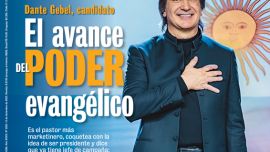







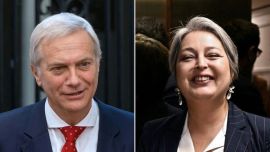
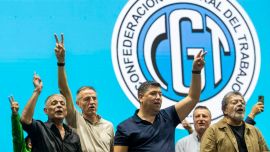

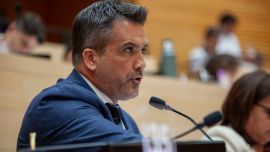
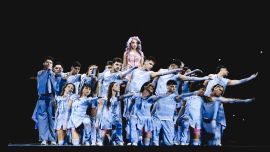
Comments